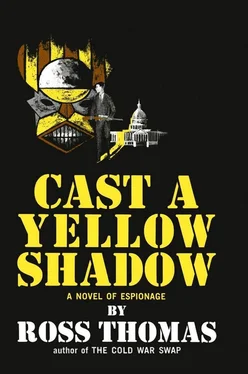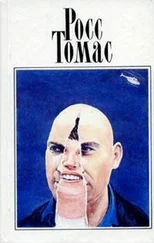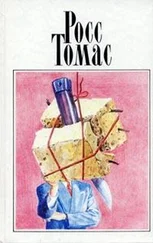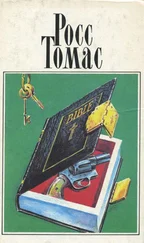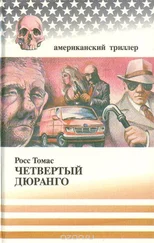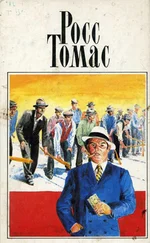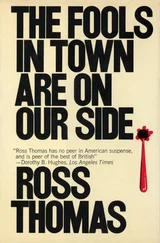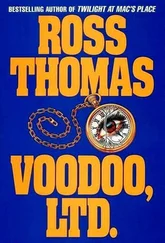“Stan said you gave it to Price and I know you gave it to Price because he tried the other night and missed. Didn’t you, Price?”
Price didn’t say anything. He looked at the carpet.
“How did Burmser know?” the man said.
“He’s doubled one of your people. He didn’t say which one.”
“Interesting.”
“I’ve got a trade for you. This for getting out of your book.” Padillo produced the cream-colored envelope and handed it to me. “I want McCorkle to read it first.”
I read it. The letter was signed by Van Zandt and witnessed by Boggs and Darragh. It had an official-looking red wax seal on it. It said that certain persons had been engaged to “effect my assassination” and that “this was done to create a proper climate for understanding the problems that confront my country.” There was more to it, but those were the key phrases. I handed the letter to the man in the sweater.
He read it and the kindly, professorial manner almost vanished.
“Is it real?” he demanded.
“It’s real,” Padillo said.
“When was the attempt to be made?”
Padillo looked at his watch. “A half-hour or so ago.”
Padillo told him what had happened. “When it comes out, though, it comes out this way: The plot was foiled — that’s a good word, isn’t it? — by the British Secret Service or MI 6 or whatever you want to use, aided by Mustapha Ali, a member of the Black Muslims.”
“Come off it, Padillo,” Price said.
“That’s the way it comes out,” Padillo said.
The man in the sweater tapped the cream-colored letter on the coffee table in front of him and looked at Padillo. “All right. It’s a trade.”
“What happens next?”
“We’ll give our Ambassador to the UN time enough to draft a speech. When is the old man due in New York?”
“Tomorrow,” Price said.
“Will he go?”
“He knows that someone now has that letter.”
“Does he know who?”
“No.”
The man in the sweater took off his glasses and polished them on his sleeve. “Well,” he said again. “There’s much to be done.” He rose. The rest of us rose too. “I think you’d better remain here, Price,” the man said.
He walked with us to the door. “You’re no longer working for Burmser, Mr. Padillo?”
“No.”
“Have you considered other employment?”
“No.”
“Would you be interested?”
“I don’t think so,” Padillo said. “I’m retired.”
“If you change your mind, please let me know,” the man said. “We perhaps don’t pay as well, but—”
“I’ll keep it in mind,” Padillo said.
“Do,” the man said.
We went through the door and out into the afternoon air. The man in the grey sweater watched us from behind his screen door. He stood there and tapped the cream-colored letter against his left thumb until I opened the car door and got in.
“I have to meet my wife,” I said to Padillo.
He looked at me and grinned. “Think she’ll be on time?”
The next time I saw Michael Padillo was three days later. He was standing at the bar listening to the lameduck Congressman. The Congressman had a large pile of money next to his drink. “Strictly cash from now on,” he was telling Padillo. “Credit cards are an inflationary danger.”
“A threat to the economy,” Padillo said, excused himself, and walked over to me.
“Fredl’s joining us for dinner,” I said.
“Good. How is she?”
“She’s all right.”
“Still angry?”
“She’s about over it.”
“It was a tough story to have to sit on.”
The story about the assassination attempt had made a splash and Fredl had fumed as she read it and watched it unfold on television. Great Britain’s Ambassador to the United Nations had made a rouser of a speech, waving the letter in evidence. Van Zandt had fled back to his country and his cabinet had resigned. There was some more talk about economic sanctions. Mush was something of a curiosity in the press for a few days and his cover as a narcotics agent was broken. He resigned several days later, the papers said, “to devote his full time to the Black Muslim cause.” The British Secret Service received a discreet pat on the back and a few editorials wondered how the FBI had been keeping itself busy. Near the end of the third day, the story was dying.
Padillo and I went over to the bar and Karl moved down to serve us.
“The Congressman’s back, I see.”
“He’s thinking of running again next term,” Karl said. “I discouraged him.”
“I’ll try a vodka martini,” I said. Padillo said he would too. Karl mixed the drinks and served them. “Congress adjourned today,” he said.
“That’ll leave your mornings free.”
“You can go back and read about the eighty-nine or so that you didn’t have the chance to hang around,” Padillo said.
Karl shook his head gloomily. “It’s not the same,” he said and moved on down the bar to a customer.
Padillo shifted his drink around on the bar, making the pattern of a small oblong box.
“They came back. Not Burmser; it was a new pair. New to me anyway.”
I looked into the mirror. There was nothing to say yet.
“Sylvia said to say goodbye,” he said.
“I thought she might stay.”
He picked up his drink and inspected it. “That was mentioned.”
“But you discouraged it.”
“Yes.”
“When did they come back? The pair, I mean.”
“This afternoon. I’ve been restored to the good-graces category.”
“What about you and Sylvia?”
“We talked.”
“About what; your yellow shadow?”
“That was mentioned.”
“Some days you talk too much.”
Padillo sighed and tasted his drink. “Some days I think you’re right.” He paused and looked into the mirror. “I may not be around for a few weeks.”
I nodded. “Where’ll you be?”
He almost smiled, but didn’t quite make it. “I think someone’s looking for her husband.” I turned and Fredl had just come through the door. She paused and glanced around and when she saw me, she smiled. There were a great many things I would do for that smile.
“Where’re you going to be?” I said again.
Padillo sipped his drink. “Out of town,” he said.
I left the bar and Padillo and walked quickly towards Fredl. I didn’t bother to notice the color of his shadow.
